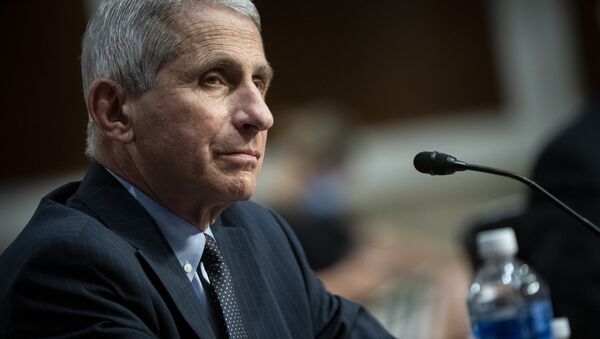“The models tell us if we don't do what we need to in the fall and winter, we could have 300,000-400,000 COVID-19 deaths," Fauci, who heads the National Institute of Allergy and Infectious Diseases (NIAID) at the US National Institutes of Health (NIH), said in a Tuesday web event hosted by American University.
However, Fauci warned that this won’t be the long-anticipated second wave of COVID-19 discussed in the spring and summer months, but rather just "a resurgence of the wave we began with."
According to data from the US Centers for Disease Control and Prevention (CDC), the US has not registered fewer than 13,000 new COVID-19 cases per day since March 24, when the initial outbreak in the United States was still accelerating, hitting a low of 13,284 per day on May 17. The daily low in reported deaths was 175 on September 7; the last time it was that low was on March 23, and the average has remained far higher. On October 6, the seven-day moving average was 694 deaths per day.
Fauci blasted political division over responses to the pandemic, such as debates over lockdowns, school closures, social distancing guidelines and mask-wearing, many of which have been called into question on a national stage by US President Donald Trump.
"When you have a public health crisis, everybody's got to be pulling together in the same direction … You can't have divisiveness and rancor in public health messages, it gets in the way of getting the job done,” Fauci said. “When you make public health measures an oppositional position, you've essentially lost the game.”
"You can't be critical of the people” who refuse to follow guidelines, Fauci counseled. “Try to appeal to the part of them that can rationalize ... Just look at the statistics ... That is a reality."
"Maybe 50% of you hate me because you think I'm trying to destroy the country, but listen to me for six weeks or so and do what I say, and you'll see the numbers go down," Fauci said.
At his campaign rallies across the country, Trump has made enforcement of such measures extremely lax and urged his conservative base to force local politicians to “open up” their states once more. He has also criticized wearing masks to prevent the spread of SARS-CoV-2, the virus that causes COVID-19, taking the issue to the debate stage, as when he criticized Democratic rival Joe Biden for wearing a mask at their debate last week.
"I wear masks when needed. I don't wear masks like him, every time you see him he's got a mask. He could be speaking 200 feet away and he shows up with the biggest mask I've ever seen," Trump told debate moderator and Fox News host Chris Wallace on September 29 about Biden. Three days later, Trump publicly revealed he had tested positive for SARS-CoV-2 and spent several days at Walter Reed National Military Medical Center, across the street from the NIH campus in Bethesda, Maryland.
Trump returned to the White House on Monday, but has remained in social isolation in the residential wing of the mansion since.
Interestingly, the NIAID chief dissented from Trump’s lofty promises of a COVID-19 vaccine coming in just a matter of weeks, saying he did not expect one to be approved by the Food and Drug Administration and widely available before the spring of 2021 - the same answer CDC Director Robert Redfield gave last month.
Scott Atlas, a Hoover Institute senior fellow and adviser on Trump's coronavirus task force, has said that if a US vaccine is approved by mid-October, 100 million doses could be ready by the end of the year and some 700 million doses by April 2021.




